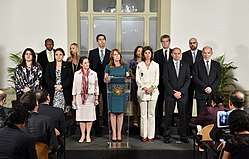Lima Group
Grupo de Lima The Lima Group | |
|---|---|
 Member states | |
| Official languages | |
| Type | Intergovernmental organization |
| Membership | |
| Establishment | Lima, Peru |
• The Lima Declaration | August 8, 2017 |
The Lima Group (GL; Spanish: Grupo de Lima, Portuguese: Grupo de Lima) is a multilateral body that was established following the Lima Declaration on 8 August 2017 in the Peruvian capital of Lima, where representatives of 17 countries met in order to establish a peaceful exit to the crisis in Venezuela.[1]
Among other issues, the group demands the release of political prisoners, calls for free elections, offers humanitarian aid and criticizes the breakdown of democratic order in Venezuela under the Bolivarian Government of Venezuela.
History
The Lima Declaration
The Lima Declaration established outlines and goals of the Lima Group in their attempt to mediate the crisis in Venezuela.[2]
| Introduction Establishes member states and outlines the democratic and noninterventional ambitions of the group to find a peaceful solution to the crisis in Venezuela. |
Declaration of Lima Joint Declaration 007 - 17
The Foreign Ministers and Representatives of Argentina, Brazil, Canada, Chile, Colombia, Costa Rica, Guatemala, Honduras, Mexico, Panama, Paraguay and Peru, meeting in the city of Lima, on 8 August 2017, to address the critical situation in Venezuela and explore ways to contribute to the restoration of democracy in that country through a peaceful and negotiated solution; Encouraged by the spirit of solidarity that characterizes the region and the conviction that negotiation, with full respect for the norms of international law and the principle of nonintervention, does not violate human rights and democracy, and is the only tool that ensures a lasting solution to the differences; |
| Declarations Highlights the positions and goals of the Lima Group regarding the crisis in Bolivarian Venezuela. |
They declare:
|
2018 Venezuelan presidential elections
The Lima Group has overtly condemned the presidential elections called for by the Bolivarian government, describing them as unobserved, unjust and undemocratic.[3] Days before the planned election date, the Lima Group – alongside the United States and the European Union – called for the cancellation of the election and prepared for responses should the election be held.[4] Following the election which strengthened President Maduro's position, the fourteen member nations of the Lima Group recalled their ambassadors from Venezuela.[5][6]
Membership

Twelve countries initially signed the declaration: Argentina, Brazil, Canada, Chile, Colombia, Costa Rica, Guatemala, Honduras, Mexico, Panama, Paraguay and Peru. Guyana and Saint Lucia joined later.[7]
Observers and support
The organization is supported by Barbados, the United States, Grenada, Jamaica and Uruguay, who attended the initial meeting, as well as organizations such as the Organization of American States and the European Union. In addition, the Venezuelan opposition has given their support.[8]
The Lima Group supported the sanctions Panama placed against high-level Venezuelan officials, which the Panamanian government accused of money laundering, supporting terrorism and the funding of weapons of mass destruction, and defended Panama after the Bolivarian government retaliated.[9]
See also
References
- ↑ "Grupo de Lima | América Latina". Deutsche Welle (in Spanish). 14 November 2017. Retrieved 15 February 2018.
- ↑ "Declaration of Lima". Ministry of Foreign Affairs of Peru (in Spanish). Government of Peru. Retrieved 15 February 2018.
- ↑ "Regional neighbors call on Venezuela to cancel election". Washington Post. 2018-05-14. ISSN 0190-8286. Retrieved 2018-05-15.
- ↑ "Regional 'Lima Group' leaders urge Venezuela to suspend election". Reuters. Retrieved 2018-05-15.
- ↑ "Los 14 países del Grupo de Lima llaman a consultas a sus embajadores en Caracas". La Patilla (in Spanish). Retrieved 2018-05-21.
- ↑ "Lima Group recalls Venezuela ambassadors, condemns vote". Deutsche Welle. 21 May 2018. Retrieved 21 May 2018.
- ↑ "Perú convoca al Grupo de Lima para analizar elecciones en Venezuela". El Nacional (in Spanish). 8 February 2018. Retrieved 15 February 2018.
- ↑ "Cancilleres firmaron la Declaración de Lima - Caretas". Caretas. 3 August 2017. Retrieved 15 February 2018.
- ↑ "Grupo de Lima respalda a Panamá tras sanciones de Venezuela en su contra". La Patilla (in Spanish). Retrieved 2018-04-07.